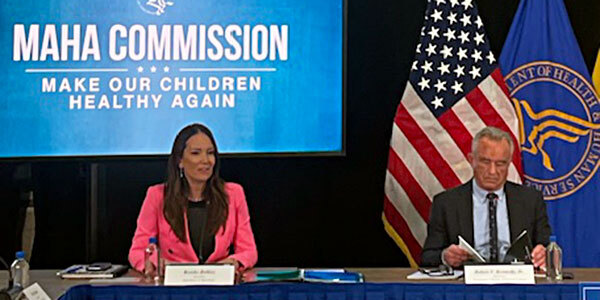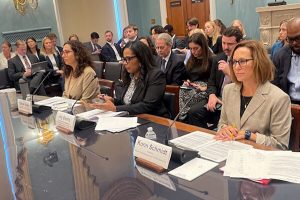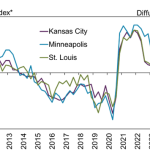Trump administration releases MAHA strategy report

MAHAReport-RFP-091525
Health and Human Services Secretary Robert F. Kennedy Jr., Agriculture Secretary Brooke Rollins and other federal officials today released the Trump administration’s “Make Our Children Healthy Again Strategy.”
The strategy report, which followed one focused on stating the health problems facing children, did not appear to differ significantly from a leaked draft.
Kennedy said the United States is “the sickest country in the world” and listed a number of accomplishments and expected accomplishments on health and food policy. Kennedy also said President Trump will make a related announcement later today.
Rollins listed previously announced initiatives such as the 12 states that have been approved to ban purchases of sweetened products and beverages with Supplemental Nutrition Assistance Program benefits. She also said USDA will announce a “farm to school” request for applications to buy foods that is “streamlined.” Rollins said the programs will connect farmers with the “child nutrition marketplace.”
The report does not call for the bans or severe restrictions on pesticides and other chemicals that Kennedy and his Make America Healthy Again movement have severely criticized, although Environmental Protection Agency Administrator Lee Zeldin noted that EPA recently rejected a number of applications for chemicals.
The report says that the Environmental Protection Agency, the Agriculture Department and the National Institutes of Health “will develop a research and evaluation framework for cumulative exposure across chemical classes. Consistent with statutory obligations under the Federal Insecticide, Fungicide, and Rodenticide Act and the Food Quality Protection Act, EPA will focus on pesticides acting through a common mode of action.”
Taking questions from the press, Kennedy deferred to Zeldin on pesticides. Zeldin noted that EPA is concerned about imported pesticides and believes in precision agriculture. Rollins said that EPA is the “most religious, data-backed” agency and that crop protection tools are vital to avoiding compromises to “our food supply system.” She added that drones will make it possible to show down to “a stalk of corn” where a bug needs to be eliminated.
While agriculture industry statements were generally positive, MAHA advocates and more traditional critics expressed their disappointment.
CropLife America President and CEO Alexandra Dunn said the group “appreciates this administration and the MAHA Commission for inviting feedback and listening to America’s farmers and agriculture industry — and recognizing that pesticides are important tools that help farmers grow healthy, affordable, and abundant food for American families.”
Corn Refiners Association President and CEO John Bode said, “CRA supports the administration’s continued focus on improving public health, understanding that America’s food producers are a key partner in this effort. Nutritional quality of the consumer diet is determined by the nutrient content of foods eaten, not the degree of processing. It would be counterproductive to discourage consumption of highly nutritious foods that meet real world consumer needs, like convenience or increased fiber, simply because the food is more processed. American consumers have varying dietary needs, and innovation can help supply a diverse array of options to meet those needs.
“As the report emphasizes the importance of soil health, we are proud that American corn refiners have long supported the adoption of regenerative agriculture practices, such as cover crops, reduced or no-till, and crop rotations, on more than 5.5 million acres of U.S. farmland. That’s an area roughly the size of New Jersey. These efforts are improving soil health, reducing greenhouse gas emissions, and enhancing water retention and biodiversity, all while helping farmers strengthen their operations.”
National Corn Growers Association President Kenneth Hartman Jr., an Illinois farmer, said in a news release, “The policy recommendations related to crop production, released today by the MAHA Commission, appear to be a reasonable and science-based approach for achieving its objectives. We are encouraged that when the commission engaged with agricultural stakeholders and followed the science, it reaffirmed what we already know: EPA is the appropriate agency for regulating crop inputs. We are also delighted to see precision agriculture, soil health and land stewardship prioritized, as these are areas in which corn farmers have led the way for many years. We look forward to working with the administration and Congress as they turn to the implementation of the report.”
The American Soybean Association today expressed “cautious optimism” about the report, but said, “ASA remains concerned about the misinformed rhetoric from some commission members around edible soybean oil. Not only is soybean oil backed by decades of science confirming its safety and nutritional value for consumers, but it is also a vital domestic market. We urge careful consideration of any upcoming rulemakings that could negatively impact U.S. farmers and the public.”
National Oilseed Processors Association President and CEO Devin Mogler said, “While this report represents a step in the right direction, NOPA will remain vigilant in addressing policies and public statements that stoke fear based on misinformation rather than sound science.”
The National Sorghum Producers said, “The strategy affirms the Environmental Protection Agency’s role as the global gold standard in regulating crop protection tools, and it reflects respect for sound science in guiding federal decision-making. The report also highlights farmers’ leadership in innovation, from conservation and soil health to the adoption of precision agriculture technologies that improve sustainability and reduce inputs.”
National Association of Wheat Growers President Pat Clements said, “We urge the MAHA Commission to recognize the critical balance between agricultural productivity and environmental stewardship, and to support policies that enable farmers to continue producing the food, fuel and fiber our country needs.”
NAWG said the commission’s framing of enriched and refined grains as “ultraprocessed” raised broad generalizations that misrepresent their value in a healthy diet.
“Enriched and refined grains — like bread, pasta and cereals — are important sources of fiber, iron, folic acid, and other essential nutrients for millions of Americans,” said Clements. “These foods are often fortified to help fill key nutrient gaps, especially in underserved populations. The evidence simply does not support the idea that these grain products, when consumed as part of a balanced diet, are harmful to health.”
USA Rice said it “appreciates the hard work and engagement of the MAHA Commission with the agricultural community as they worked to finalize its recommendations in the Make Our Children Healthy Again Strategy.”
Association of Equipment Manufacturers Senior Vice President of Government and Industry Relations Kip Eideberg said AEM applauds the commission “for recognizing the critical role that precision agriculture technology plays in ensuring that future generations grow up in a cleaner, healthier and more resilient America.”
David Murphy, founder of United We Eat and a former finance director for Kennedy’s presidential campaign, said, “This report is a major missed opportunity for the Trump administration and a clear sign that Big Ag, Bayer, and the pesticide industry are firmly embedded in the White House and intentionally short-circuiting Trump’s campaign promise to the millions of MAHA voters who helped him return to power. In the past four months alone, three major independent peer-reviewed studies have found definitive links between pesticides like glyphosate, paraquat, and chlorpyrifos to six of the top 10 common cancers found in the U.S., Parkinson’s disease, and brain damage in children.”
Zen Honeycutt, founder of Moms Across America, said “While Moms Across America is thrilled that the MAHA Commission Strategy Report addresses a wide range of environmental factors that have never before been addressed by any other administration, we are deeply disappointed that the committee allowed the chemical companies to influence the report. Clearly, eliminating the words ‘glyphosate and atrazine’ (that were in the first report) is not a result of new science that shows these two most widely used herbicides to be safe, but rather a tactic to appease the pesticide companies. We would rather that this MAHA Commission report had put the health and safety of our children first and made a bold commitment to reduce our children’s exposure to thousands of harmful pesticides; many of which are banned in other countries, many more which have been given emergency use authorization without safety studies. Reducing exposure to these pesticides is crucial to making America healthy again. We can only continue to hold President Trump and Kennedy to their word and educate the public about the truth.”
The Center for Food Safety said, “The commission doubled down on hollow rhetoric. Its only mention of pesticides is an Orwellian promise to ensure ‘confidence in EPA’s robust pesticide review procedures’ — procedures courts have repeatedly found unlawful and that frontline communities know cannot be trusted. Instead, it says that it will speed up pesticide approval and it will ‘partner’ with the pesticide industry to ‘educate’ the public about the ‘robust review’ of EPA’s regulation of pesticides to provide the public with ‘confidence.'”
CFS added, “It fails to address urgent core issues such as the continued approval and overuse of hazardous toxic pesticides like dicamba, glyphosate, and atrazine, and the lobbying campaign of the pesticide industry seeking to be shielded from legal liability for their products’ health harms.”
Kari Hamerschlag, deputy director of the Food and Agriculture Program at Friends of the Earth, said, “It’s deeply disappointing that Trump’s MAHA Commission report has the agrochemical industry’s fingerprints all over it. This report is not a roadmap for improving children’s health — it’s a green light for increased agribusiness profits at the expense of our communities, environment and children’s well-being.
“While there are some positive but tepid recommendations on whole foods, organics, conservation and regenerative agriculture, these ring hollow given the administration’s massive cuts to healthy school meals, local food infrastructure and conservation programs. Perhaps most galling is the report’s promotion of ‘shovel-ready conservation projects already planned on farms’ after the Trump administration cancelled billions of dollars’ worth of conservation projects already underway on farms across America.”
The International Fresh Produce Association said, “We applaud the commission’s recognition of the vital role ‘whole, healthy’ foods like fresh produce play in improving health outcomes and reducing healthcare costs. Simply put, you cannot make America healthy again without fruits and vegetables.
“Building on this momentum, IFPA urges policymakers to take bold, practical action. Our evidence-based policy recommendations call for the Department of Health and Human Services to embed produce prescriptions as a covered benefit within federal health programs such as Medicare, Medicaid, and the Department of Veterans Affairs; urge Congress and USDA to expand the Fresh Fruit and Vegetable Program to all schools and improve fresh produce procurement options in feeding programs; ask FDA to prioritize clear and transparent front-of-pack labeling to help consumers make informed choices; and support all production systems including voluntary, incentive-based regenerative agriculture policies that focus on strengthening soil health, biodiversity and water efficiency while ensuring a sustainable produce supply.”
Western Growers President and CEO Dave Puglia said, “The Trump administration’s MAHA Commission finally places a long-overdue emphasis on realigning our national food and nutrition policies to greatly enhance the role of fresh produce. At the same time, the commission has created a roadmap that cuts regulatory red tape and fosters innovation in much-needed research necessary to protect and strengthen the ability of American growers to provide these fresh fruits, vegetables and tree nuts. We thank the administration for this needed disruption to our national food policies and look forward to collaborating with the administration and the MAHA Commission on making America’s farmers the foundational strength of a healthier population.”
International Dairy Foods Association President and CEO Michael Dykes said, “IDFA appreciates that the MAHA Commission’s strategy recognizes milk and other dairy foods as wholesome, nutrient-dense options that play a vital role in health and wellness. We urge the federal government to follow through on this strategy by acknowledging the health benefits of dairy foods at all fat levels in the upcoming Dietary Guidelines for Americans and throughout all federal nutrition programs. Additionally, we encourage USDA to use this strategy as the basis for working with Congress to expand SNAP dairy incentives to include more wholesome varieties of milk, cheese, yogurt and cultured dairy products for SNAP participants.”
National Milk Producers Federation President and CEO Gregg Doud said, “The MAHA Commission’s Make Our Children Healthy Again Strategy recognizes what the latest science indicates and what we’ve long been saying: that getting whole milk back into schools and boosting dairy in diets helps meet America’s nutritional needs, and that it is critical to improving the health of our nation’s children.”
he Meat Institute, which includes meat packer and processors, said it was “especially pleased to see the strategy seeks to support adoption of Hazard Analysis and Critical Control Points food safety protocols.”
“It is great to see the coordination between Health and Human Services and the U.S. Department of Agriculture on food safety,” said Meat Institute President and CEO Julie Anna Potts.
The National Turkey Federation said it “commends MAHA’s efforts to modernize regulatory frameworks to streamline processes, while emphasizing that food safety must remain uncompromised.”
Tom Super, National Chicken Council spokesperson, said, “Combined with its nutritional value, positive health benefits, popularity, versatility and affordability, chicken is poised to be a key contributor in Making America Healthy Again and a key source of protein in the upcoming Dietary Guidelines. We look forward to partnering with the Trump administration to keep nutrient dense, healthy, and affordable protein like chicken at the center of the plate.”
The National Cattlemen’s Beef Association said, “The second report expanded on the benefits of high-quality protein like beef and the critical role cattle producers play in helping make America healthy again.”
The National Pork Producers Council thanked the Trump administration for “listening to our concerns,” but added, “the strategy incorporates a range of initiatives that risk stigmatizing modern farming while deviating from President Trump’s directives related to food security, safety and affordability. And, the regulatory expansion outlined in the report could lead to increased litigation against American businesses, including food and agriculture.”
The American Heart Association said it “sees opportunities to add to and build upon several of the report’s many recommendations to have the greatest positive impact on the nation’s health.
“We fundamentally agree that medical research, from basic science to real-world interventions, is essential to improving and promoting health. To fully realize this potential, the administration should increase investments in all health research, including nutrition, to prevent chronic disease and promote the health of children and adults. Specifically, we urge the administration to prioritize research on food is medicine approaches to discover the best and most cost-effective ways to integrate healthy food into chronic disease care in ways that could transform care delivery and improve health patient outcomes.
“The Dietary Guidelines for Americans are an essential tool to promote science-based recommendations that shape federal food and nutrition programs, inform national nutrition policy and empower individuals and families to make healthier choices. It is critical that the updated DGAs remain grounded in the best available nutrition science that emphasizes eating fruits and vegetables, legumes, nuts, whole grains and healthy sources of protein from plants, fish and seafood, lean cuts of animal proteins and low-fat/fat-free dairy. The DGAs also should emphasize the use of liquid plant oils, while minimizing trans-fat, processed meat, sodium, added sugars and saturated fat.
“The administration should increase research funding to better understand how food processing techniques and consumption of ultraprocessed foods (UPFs) can affect heart and metabolic health.
The American Heart Association said it supports “incentives” for healthy eating in federal nutrition programs but are “mainly concerned that the more than $1 trillion in cuts to Medicaid and SNAP contained in the One Big Beautiful Bill Act — combined with the administration’s proposed cuts to other nutrition programs — will reduce access to healthy foods and critical health care services for the very families who need these supports the most. The Heart Association continues to advocate for expanded access to affordable health coverage and nutritious foods for all.
“No strategy to improve children’s health is complete without a comprehensive approach to tobacco control — both preventing initiation and encouraging cessation — to curb the incidence of chronic disease.”
The School Nutrition Association, which represents school food service directors and the companies that make school foods, welcomed the report, but urged Congress and the administration to increase funding for school meal programs. SNA also said it has problems with the commonly used Nova classification for processed foods, which it said defines ultraprocessed foods “too broadly, for example, lumping hummus in the same ultra-processed category as cupcakes.”
American Farm Bureau Federation President Zippy Duvall said, “A renewed focus on American-grown fresh fruits, vegetables and meat, along with reintroducing whole milk into the school meal programs, can help provide a foundation for a lifetime of smart choices. Reducing or streamlining regulations in smart ways can allow farms operating on very thin margins to innovate, diversify and respond to consumer demand. Prioritizing voluntary conservation efforts for farmers and ranchers and optimizing EPA’s already robust pesticide regulatory process to accelerate innovation are welcome recommendations. We appreciate the commission’s willingness to meet with farmers across the country, hear our concerns and develop smart solutions.”
Senate Agriculture Committee Chairman John Boozman, R-Ark., and House Agriculture Committee Chairman Glenn “GT” Thompson, R-Pa., said in a joint statement, “We appreciate the efforts of the MAHA Commission to enhance engagement with agricultural producers and stakeholders in developing these updated recommendations. America’s farmers are stewards of the land, producing our nation’s food while protecting the environment. Their expertise is essential in shaping sound, science-based policies that maintain a safe and healthy food supply.
“It is imperative that we continue to prioritize innovation and ensure access to practical tools that enable our hardworking producers to meet growing production demands while maintaining a strong commitment to environmental stewardship. We look forward to working with the administration to implement policies that advance these goals while addressing the challenges and realities encountered by farmers, ranchers and producers.”







